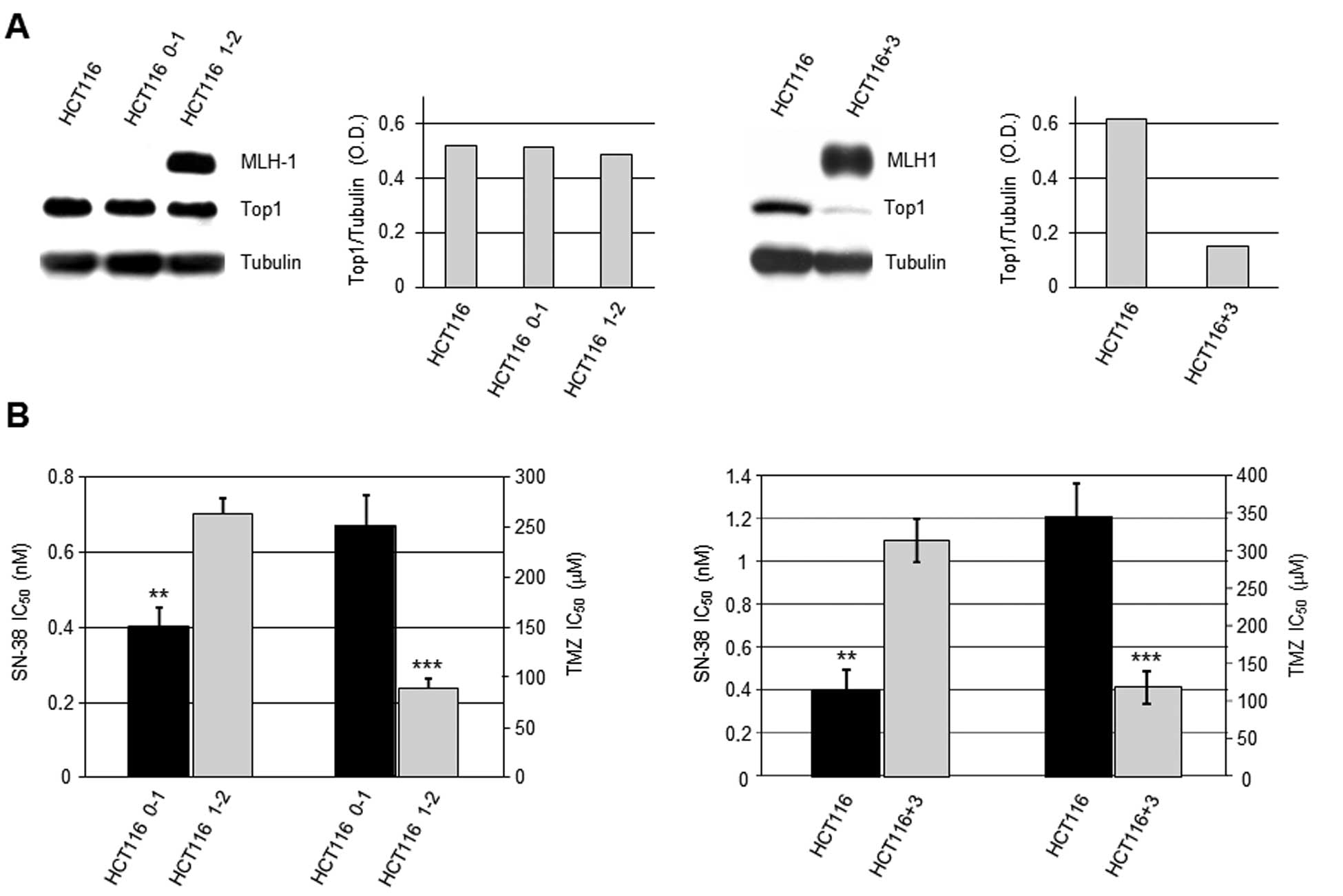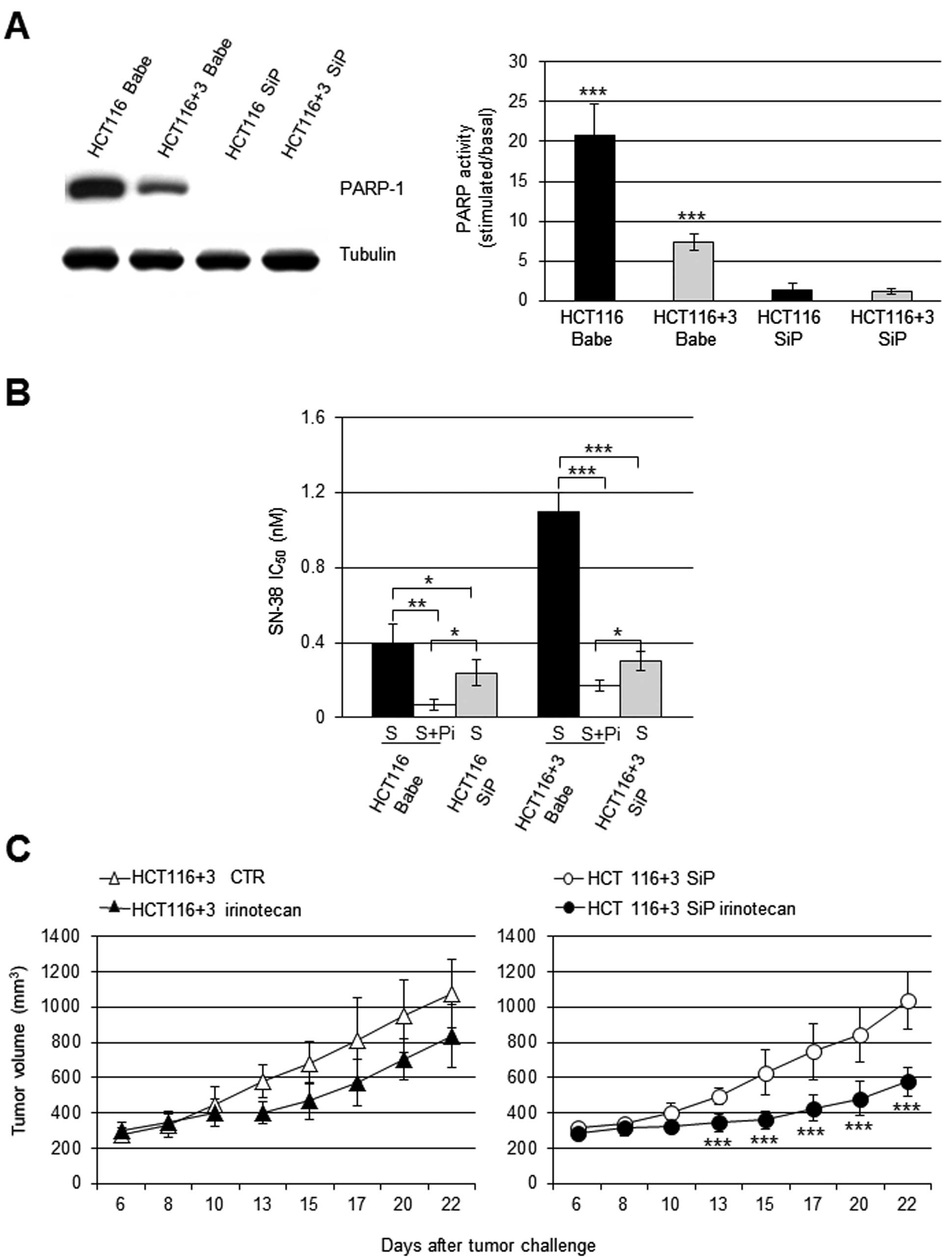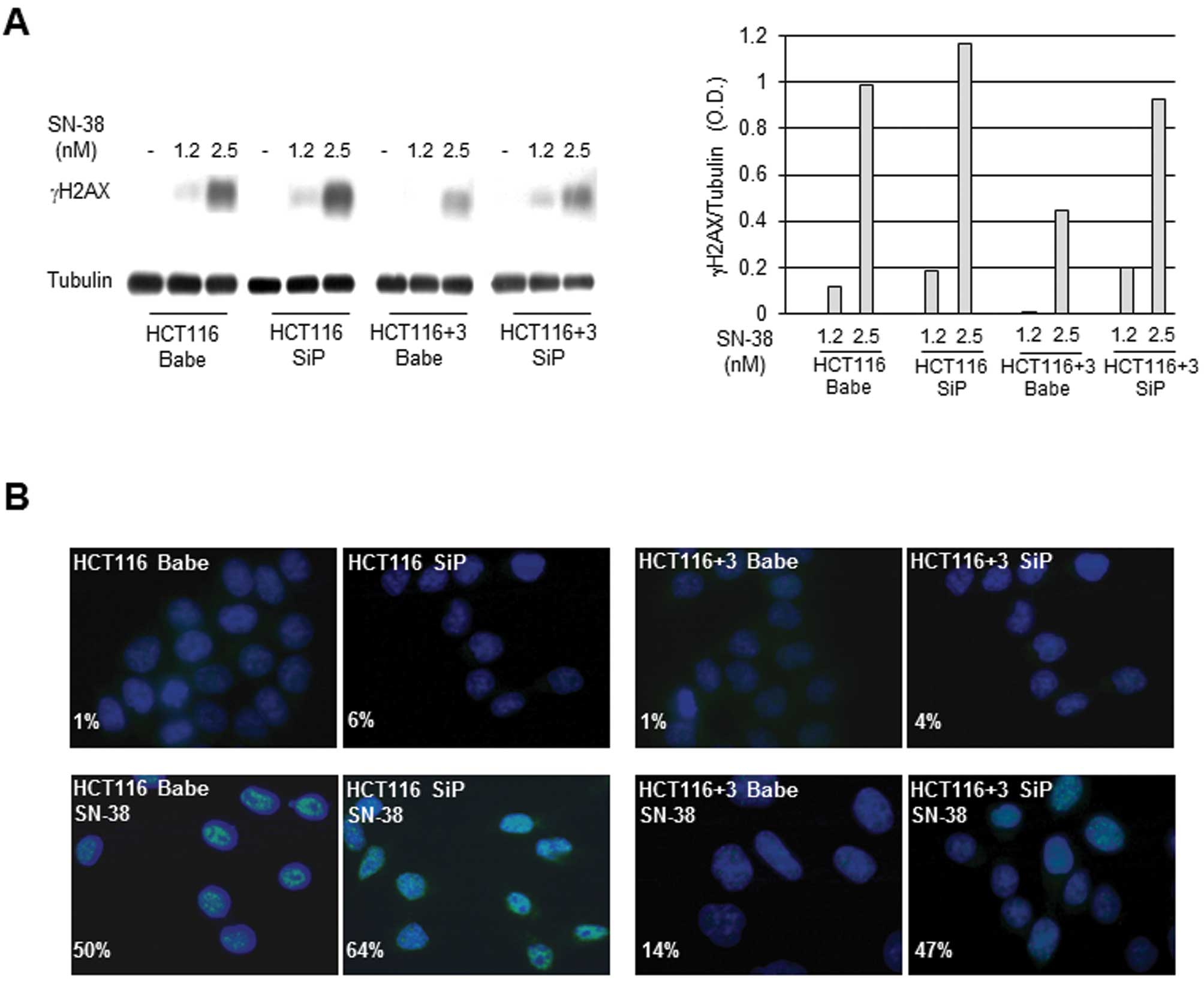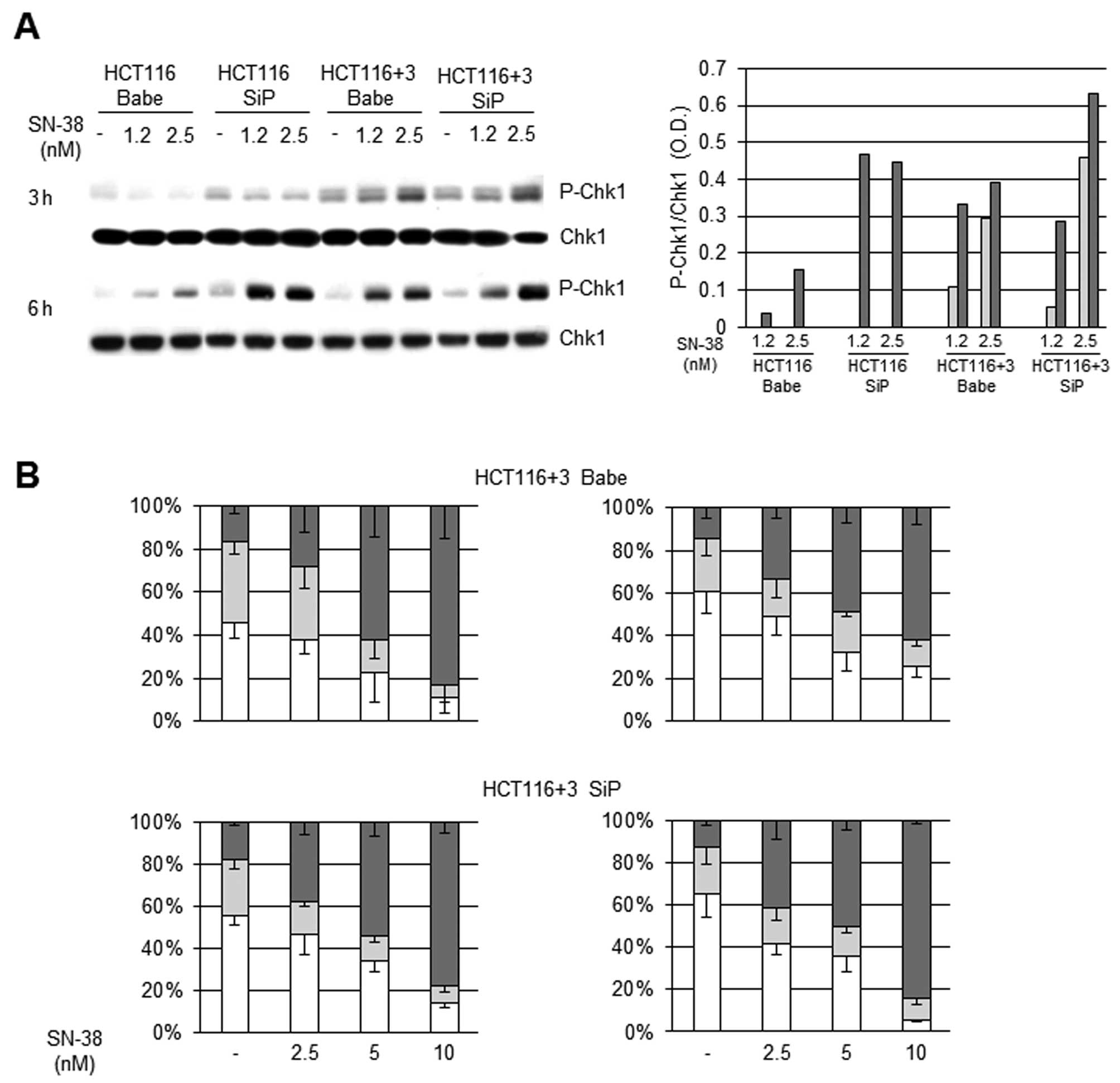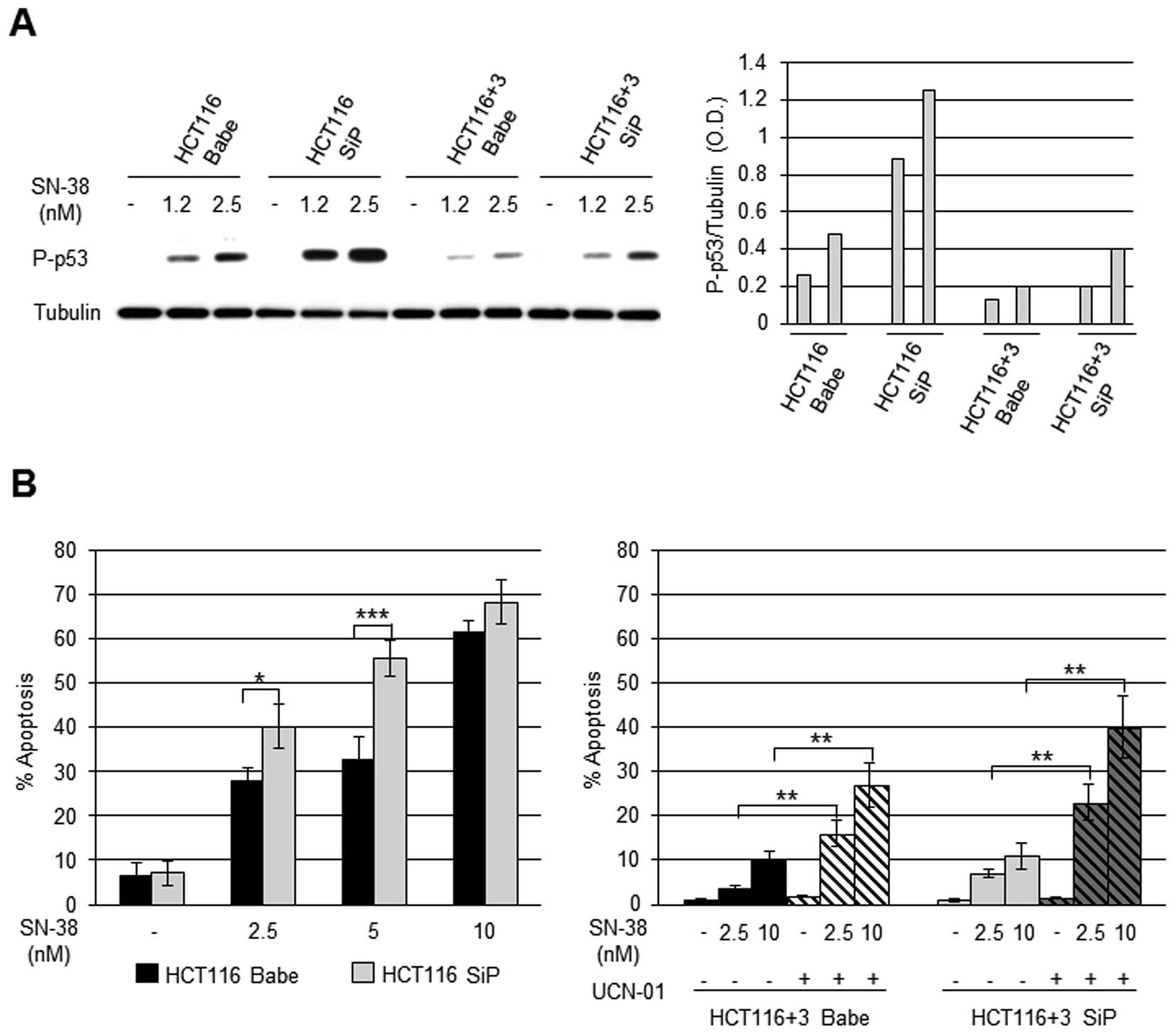|
1.
|
Davies JM and Goldberg RM: Treatment of
metastatic colorectal cancer. Semin Oncol. 38:552–560. 2011.
View Article : Google Scholar : PubMed/NCBI
|
|
2.
|
Alagoz M, Gilbert DC, El-Khamisy S and
Chalmers AJ: DNA repair and resistance to topoisomerase I
inhibitors: mechanisms, biomarkers and therapeutic targets. Curr
Med Chem. 19:3874–3885. 2012. View Article : Google Scholar : PubMed/NCBI
|
|
3.
|
Miknyoczki SJ, Jones-Bolin S, Pritchard S,
Hunter K, Zhao H, Wan W, Ator M, et al: Chemopotentiation of
temozolomide, irinotecan and cisplatin activity by CEP-6800, a
poly(ADP-ribose) polymerase inhibitor. Mol Cancer Ther. 2:371–382.
2003.PubMed/NCBI
|
|
4.
|
Calabrese CR, Almassy R, Barton S, Batey
MA, Calvert AH, Canan-Koch S, Durkacz BW, et al: Anticancer
chemosensitization and radiosensitization by the novel
poly(ADP-ribose) polymerase-1 inhibitor AG14361. J Natl Cancer
Inst. 96:56–67. 2004. View Article : Google Scholar : PubMed/NCBI
|
|
5.
|
Smith LM, Willmore E, Austin CA and Curtin
NJ: The novel poly(ADP-Ribose) polymerase inhibitor, AG14361,
sensitizes cells to topoisomerase I poisons by increasing the
persistence of DNA strand breaks. Clin Cancer Res. 11:8449–8457.
2005. View Article : Google Scholar : PubMed/NCBI
|
|
6.
|
Tentori L, Leonetti C, Scarsella M, Muzi
A, Mazzon E, Vergati M, Forini O, et al: Inhibition of
poly(ADP-ribose) polymerase prevents irinotecan-induced intestinal
damage and enhances irinotecan/temozolomide efficacy against colon
carcinoma. FASEB J. 20:1709–1711. 2006. View Article : Google Scholar
|
|
7.
|
Daniel RA, Rozanska AL, Thomas HD,
Mulligan EA, Drew Y, Castelbuono DJ, Hostomsky Z, et al: Inhibition
of poly(ADP-ribose) polymerase-1 enhances temozolomide and
topotecan activity against childhood neuroblastoma. Clin Cancer
Res. 15:1241–1249. 2009. View Article : Google Scholar : PubMed/NCBI
|
|
8.
|
Schreiber V, Dantzer F, Ame JC and de
Murcia G: Poly(ADP-ribose): novel functions for an old molecule.
Nat Rev Mol Cell Biol. 7:517–528. 2006. View Article : Google Scholar : PubMed/NCBI
|
|
9.
|
Malanga M and Althaus FR: Poly(ADP-ribose)
reactivates stalled DNA topoisomerase I, induces DNA strand break
resealing. J Biol Chem. 279:5244–5248. 2004. View Article : Google Scholar : PubMed/NCBI
|
|
10.
|
Leonetti C, Biroccio A, Graziani G and
Tentori L: Targeted therapy for brain tumours: role of PARP
inhibitors. Curr Cancer Drug Targets. 12:218–236. 2012. View Article : Google Scholar : PubMed/NCBI
|
|
11.
|
Martin SA, Lord CJ and Ashworth A:
Therapeutic targeting of the DNA mismatch repair pathway. Clin
Cancer Res. 16:5107–5113. 2010. View Article : Google Scholar : PubMed/NCBI
|
|
12.
|
D’Atri S, Tentori L, Lacal PM, Graziani G,
Pagani E, Benincasa E, Zambruno G, et al: Involvement of the
mismatch repair system in temozolomide-induced apoptosis. Mol
Pharmacol. 54:334–341. 1998.PubMed/NCBI
|
|
13.
|
Tentori L and Graziani G: Recent
approaches to improve the antitumor efficacy of temozolomide. Curr
Med Chem. 16:245–257. 2009. View Article : Google Scholar : PubMed/NCBI
|
|
14.
|
Fedier A, Schwarz VA, Walt H, Carpini RD,
Haller U and Fink D: Resistance to topoisomerase poisons due to
loss of DNA mismatch repair. Int J Cancer. 93:571–576. 2001.
View Article : Google Scholar : PubMed/NCBI
|
|
15.
|
Jacob S, Aguado M, Fallik D and Praz F:
The role of the DNA mismatch repair system in the cytotoxicity of
the topoisomerase inhibitors camptothecin and etoposide to human
colorectal cancer cells. Cancer Res. 61:6555–6562. 2001.PubMed/NCBI
|
|
16.
|
Magrini R, Bhonde MR, Hanski ML, Notter M,
Scherübl H, Boland CR, Zeitz M and Hanski C: Cellular effects of
CPT-11 on colon carcinoma cells: dependence on p53 and hMLH1
status. Int J Cancer. 101:23–31. 2002. View Article : Google Scholar : PubMed/NCBI
|
|
17.
|
Fallik D, Borrini F, Boige V, Viguier J,
Jacob S, Miquel C, Sabourin JC, et al: Microsatellite instability
is a predictive factor of the tumor response to irinotecan in
patients with advanced colorectal cancer. Cancer Res. 63:5738–5744.
2003.PubMed/NCBI
|
|
18.
|
Papouli E, Cejka P and Jiricny J:
Dependence of the cytotoxicity of DNA-damaging agents on the
mismatch repair status of human cells. Cancer Res. 64:3391–3394.
2004. View Article : Google Scholar : PubMed/NCBI
|
|
19.
|
Bhonde MR, Hanski ML, Stehr J, Jebautzke
B, Peiró-Jordán R, Fechner H, Yokoyama KK, et al: Mismatch repair
system decreases cell survival by stabilizing the tetraploid G1
arrest in response to SN-38. Int J Cancer. 126:2813–2825.
2010.PubMed/NCBI
|
|
20.
|
Martin LP, Hamilton TC and Schilder RJ:
Platinum resistance: the role of DNA repair pathways. Clin Cancer
Res. 14:1291–1295. 2008. View Article : Google Scholar : PubMed/NCBI
|
|
21.
|
Papadopoulos N, Nicolaides NC, Wei YF,
Ruben SM, Carter KC, Rosen CA, Haseltine WA, et al: Mutation of a
mutL homolog in hereditary colon cancer. Science. 263:1625–1629.
1994. View Article : Google Scholar : PubMed/NCBI
|
|
22.
|
Koi M, Umar A, Chauhan DP, Cherian SP,
Carethers JM, Kunkel TA and Boland CR: Human chromosome 3 corrects
mismatch repair deficiency and microsatellite instability and
reduces N-methyl-N’-nitro-N-nitrosoguanidine tolerance in colon
tumor cells with homozygous hMLH1 mutation. Cancer Res.
54:4308–4312. 1994.PubMed/NCBI
|
|
23.
|
Vernole P, Muzi A, Volpi A, Terrinoni A,
Dorio AS, Tentori L, Shah GM and Graziani G: Common fragile sites
in colon cancer cell lines: role of mismatch repair, RAD51 and
poly(ADP-ribose) polymerase-1. Mutat Res. 712:40–48. 2011.
View Article : Google Scholar : PubMed/NCBI
|
|
24.
|
Tentori L, Leonetti C, Scarsella M,
D’Amati G, Vergati M, Portarena I, Xu W, et al: Systemic
administration of GPI 15427, a novel poly(ADP-ribose) polymerase-1
inhibitor, increases the antitumor activity of temozolomide against
intracranial melanoma, glioma, lymphoma. Clin Cancer Res.
9:5370–5379. 2003.
|
|
25.
|
Yamane K, Taylor K and Kinsella TJ:
Mismatch repair-mediated G2/M arrest by 6-thioguanine involves the
ATR-Chk1 pathway. Biochem Biophys Res Commun. 318:297–302. 2004.
View Article : Google Scholar : PubMed/NCBI
|
|
26.
|
Yoshioka K, Yoshioka Y and Hsieh P: ATR
kinase activation mediated by MutSalpha and MutLalpha in response
to cytotoxic O6-methylguanine adducts. Mol Cell. 22:501–510. 2006.
View Article : Google Scholar : PubMed/NCBI
|
|
27.
|
Adamson AW, Beardsley DI, Kim WJ, Gao Y,
Baskaran R and Brown KD: Methylator-induced, mismatch
repair-dependent G2 arrest is activated through Chk1 and Chk2. Mol
Biol Cell. 16:1513–1526. 2005. View Article : Google Scholar : PubMed/NCBI
|
|
28.
|
Marra G and Jiricny J: DNA mismatch repair
and colon cancer. Adv Exp Med Biol. 570:85–123. 2005. View Article : Google Scholar : PubMed/NCBI
|
|
29.
|
Damia G and D’Incalci M: Genetic
instability influences drug response in cancer cells. Curr Drug
Targets. 11:1317–1324. 2010. View Article : Google Scholar : PubMed/NCBI
|
|
30.
|
Sinicrope FA, Foster NR, Thibodeau SN,
Marsoni S, Monges G, Labianca R, Kim GP, et al: DNA mismatch repair
status and colon cancer recurrence and survival in clinical trials
of 5-fluorouracil-based adjuvant therapy. J Natl Cancer Inst.
103:863–875. 2011. View Article : Google Scholar : PubMed/NCBI
|
|
31.
|
Garner KM and Eastman A: Variations in
Mre11/Rad50/Nbs1 status and DNA damage-induced S-phase arrest in
the cell lines of the NCI60 panel. BMC Cancer. 206:1–13.
2011.PubMed/NCBI
|
|
32.
|
Takemura H, Rao VA, Sordet O, Furuta T,
Miao ZH, Meng L, Zhang H and Pommier Y: Defective Mre11-dependent
activation of Chk2 by ataxia telangiectasia mutated in colorectal
carcinoma cells in response to replication-dependent DNA double
strand breaks. J Biol Chem. 281:30814–30823. 2006. View Article : Google Scholar : PubMed/NCBI
|
|
33.
|
Tentori L, Muzi A, Dorio AS, Scarsella M,
Leonetti C, Shah GM, Xu W, et al: Pharmacological inhibition of
poly(ADP-ribose) polymerase (PARP) activity in PARP-1 silenced
tumour cells increases chemosensitivity to temozolomide and to a
N3-adenine selective methylating agent. Curr Cancer Drug Targets.
10:368–383. 2010. View Article : Google Scholar
|
|
34.
|
D’Onofrio G, Tramontano F, Dorio AS, Muzi
A, Maselli V, Fulgione D, Graziani G, et al: Poly(ADP-ribose)
polymerase signaling of topoisomerase 1-dependent DNA damage in
carcinoma cells. Biochem Pharmacol. 81:194–202. 2011.
|
|
35.
|
Patel AG, Flatten KS, Schneider PA, Dai
NT, McDonald JS, Poirier GG and Kaufmann SH: Enhanced killing of
cancer cells by poly(ADP-ribose) polymerase inhibitors and
topoisomerase I inhibitors reflects poisoning of both enzymes. J
Biol Chem. 287:4198–4210. 2012. View Article : Google Scholar : PubMed/NCBI
|
|
36.
|
Davidson D, Wang Y, Aloyz R and Panasci L:
The PARP inhibitor ABT-888 synergizes irinotecan treatment of colon
cancer cell lines. Invest New Drugs. 31:461–468. 2013. View Article : Google Scholar : PubMed/NCBI
|















